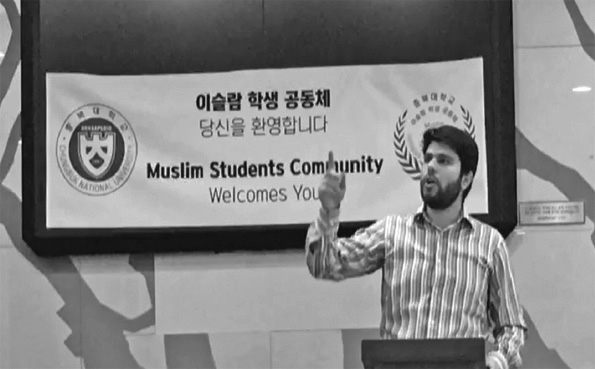
Muslim students in CBNU are primarily from Central Asia and the Middle-East. In this article, we interviewed graduate student Ayman to hear his story of Muslims living in Korea. According to Ayman’s opinion, Muslim students who are from various countries share lots of values, traditions and cultures. This is because those people acquire those values from a single source: Islam. Those things include the five daily prayers, Friday prayer, and fasting during Ramadan, the 9th month of the Arabic calendar.
Ayman said that when he came to Korea, he was worried about whether Koreans would be negative about his culture. Surprisingly, the answer to this question was not found on the Internet or in a book but in his surroundings. Although the majority of Koreans know very little about these foreign customs, they don’t get in the way of a Muslim performing his duties. Therefore, he informed his professors and friends about how and why it is important. Then, he could perform his prayers five times a day, go to Friday prayer every Friday, and fast for an entire month in Ramadan every year freely without any disturbance in his university or workplace. In addition, in accordance with his friends, they haven’t faced any disturbance even if they performed it publicly on the street.
The advantages that Ayman experienced have played an important role in building secure Muslim communities, or ‘clubs. Muslims in South Korea are largely incorporated into a variety of clubs, and the activities of the clubs are directed at both Muslims and non-Muslims in South Korea. Among these activities are arranging lectures to show Muslim heritage and science, to introduce Islam, and to clarify certain points about Islam. Also, activities are not only restricted to mosques, but they are also done in universities and other places. This shows that the knowledge of the religion was not confined to certain places nor certain people of a specified educational level. In addition, Muslims, through their tight community, were also able to attract Muslim newcomers through guiding them and helping them adapt to life in Korea without losing their Muslim identity.
The same applies to Muslim students in CBNU. In the CBUN-Islamic community, they organized an orientation for new Muslim students. The programs are divided into three areas. The first one is introducing Cheongju as a city, including the main places to visit. The second one is about how to deal with their supervisors and lab-mates. The last one is about how to adapt to the Korean society as a Muslim. They will start organizing a monthly lecture about topics related to Muslims and their life in Korea.
The Ramadan period (the 9th month in the Arabic lunar calendar) for this year was from May 17th to June 16th, and this period is regarded as the most important month for Muslims, and it is the month in which Muslims fast. During Ramadan in CBNU, the Muslim community organized their first annual event, the iftar (a fast-breaking dinner), in the student cafeteria. Ayman, who directly participated in the iftar, said that the participants of the iftar were representatives of the immigration office of Cheongju, university professors, representatives of the CBT, representatives of the various communities in the university, and a large number of Muslims and non-Muslims. The program started with a recitation of parts of the Holy Qur’an (The Holy Book of Muslims), continued with challenging games, and finally concluded with a speech given by Ayman Turk, the head of the Muslim community. He addressed that although Muslims are spread throughout a vast land area of the world and have different cultures, they all share a single faith that is considered as the tightest joining link among them. Also, he added that those Muslims are careful in delivering a bright picture of Muslim’s manners, and they show their steadfastness of their religious traditions through their interaction with their peers, professors, and society.
Choi Ye-ji, a student of the Dept. of Environmental Engineering, said, “I didn’t know that Muslim students were doing so many activities before I heard about them during this interview. In addition to such activities, when I saw Muslim students wearing hijabs on campus, I was not conscious of the Muslims because they did not cause any issues. I think that it is okay for Muslim students to follow their culture if it doesn’t irritate others.”
Next month in November, they will be organizing a big event because it will be the commemoration of the birth of their Prophet Muhammad. On that day, they will introduce to the non-Muslims their leader and share some traditional foods and customs. If you are interested in Islam, I encourage you to participate.
By Jo Se-in
si38@cbnu.ac.kr


 All
All Campus News
Campus News






 Jo Se-in
Jo Se-in











